#The Alternative Eurovision Song Contest
Explore tagged Tumblr posts
Text
Quick drawing I did of Bambiethug cuz I was bored and they’re really cool
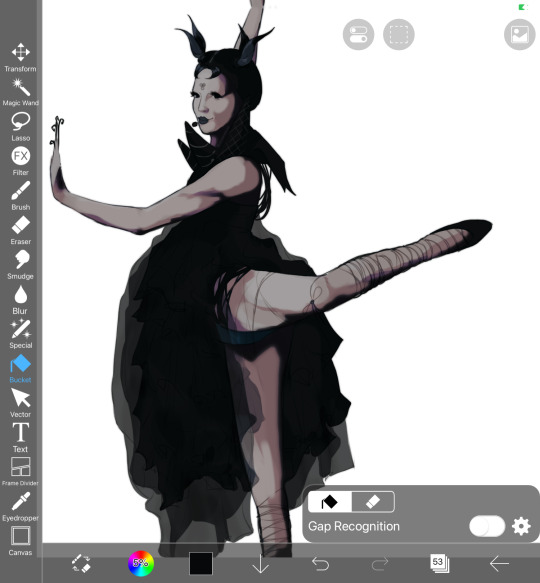
#digital art#artist#digital artist#art#artists on tumblr#digital sketch#digital illustration#digital drawing#digital painting#bambie thug#eurovison song contest#eurovision#eurovision 2024#eurovision art#eurovision fanart#semi realism#semi realistic#human artwork#drawing#illustration#redraw#fanart#bambi thug#esc ireland#altfashion#alternative#alt style#alt art
99 notes
·
View notes
Text
THANK GOD THANK YOU AUSTRIA 🙏🙏🙏
#actually felt disgusted seeing isr*el at the top of that leaderboard#but i guess thats what you get when the people who care about human rights and lives are not watching/paying for a vote#but THANK FUCK AUSTRIAAAA#not the best song but with the alternative its perfect#eurovison song contest#eurovision 2025#esc
6 notes
·
View notes
Text
instagram
#eurovision#eurovision memes#eurovision song contest#eurovision 2024#bambie thug#ailsha#lgbtq#alternative#witchblr#ireland#sweden#malmö#anti capitalism#music#memes#free palestine#Instagram
14 notes
·
View notes
Text

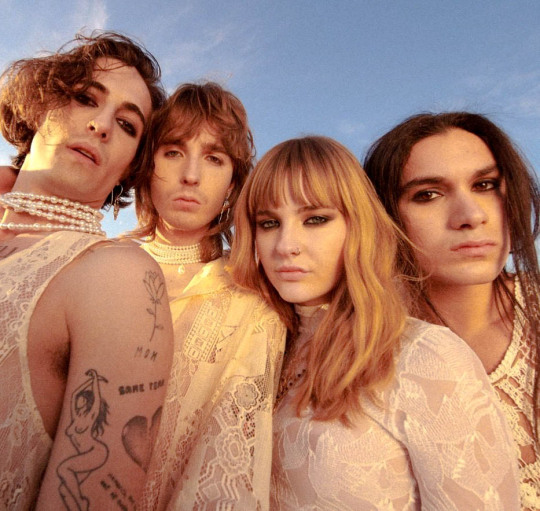
Teatro d'ira: Vol. I, Måneskin, 19. March 2021.
After riding the success of their Eurovision win, the newly famous Italian rock band Måneskin followed their triumphant single with an internationally acclaimed album, Teatro d'ira Vol. I. A not-so-revolutionary peace of music, but definitely a different one considering the music landscape then.
The centrepiece of the album is ZITTI E BUONI. Songs following it were mostly made around it, so some of them may feel like plain copies of the single with some minor differences to make them distinguishable. This is especially the case with the Italian songs.
On the other hand, we have the two English songs, I WANNA BE YOUR SLAVE and FOR YOUR LOVE. Honestly, they are horrendous and nothing more than parodies of American rock songs. They just sound embarrassing, especially I WANNA BE YOUR SLAVE. A song that stunned me when I first heard it for its mediocrity and amaturism, I truly thought that it was a joke. But at the end of the day, it's nothing more than a song that was only put there to appeal to the English market.
Something to point out while we are talking about the English songs is David's voice. The performances were weak compared to the Italian songs. In the Italian ones you could feel his emotion, his pain, desire, anger but here they felt soulless and dull, and the simplicity of the lyrics only impacted the delivery more.
On the brighter side, the Italian songs (that are the majority of the album) are fairly decent and solid rock songs; the standouts for me are definitely ZITTI E BUONI, LA PAURA DEI BUIO, and the lovely VENT'ANNI.
All in all, it's a standard rock album with good performances by the band. The impact of their fashion style, on-stage energy, European roots, and overall image helped them a lot to achieve their status and make this simple album something special.
I would give it a: If you can ignore some parts of it, you'll have a pretty decent time listening to it.
If you found my review worth discussing in any way, I'm happy to do so.
Yours trully,
MJ.10.
#music#music blog#new music#live music#maneskin#damiano david#thomas raggi#vic de angelis#victoria de angelis#ethan torchio#eurovision#alternative rock#rock#punk rock#eurovison song contest#zitti e buoni#lonliest#rush#honey are you coming?
12 notes
·
View notes
Text
Lead singer, Lauri Ylönen, of Finnish rock band, The Rasmus, joins us on this episode of The Adamantium Podcast. We discuss their upcoming 11th studio album, Weirdo, and latest single “Break These Chains.” We also talk about their global hit “In The Shadows,” and how it changed their lives forever, their experience in the 2022 Eurovision Song Contest, headlining the upcoming Atlas Festival in Ukraine, and reminiscing on The Rasmus’ first ever show when he was in eighth grade.
#the adamantium podcast#podcast#the rasmus#lauri ylönen#music podcast#music journalism#toronto podcast#toronto music scene#canadian podcast#Finnish music#finnish rock#rock music#alternative rock#gothic rock#indie rock#funk rock#podcaster#podcasting#podcast interview#interview#interviewer#podcast host#talk show#talk show host#singer#eurovision#eurovison song contest#SoundCloud
0 notes
Text
#ska#reggae#newmusic#Eurovision#eurovision2025#Eurovision Song Contest#Alternative#Take a moment to pause#Collect Your Thoughts
0 notes
Text
I’ve been watching Eurovision every year since 2012 and here are some of the things I’ve noticed people complain about that make sense if you thing about them just a little:
1. If all the pro-Palestine viewers are boycotting the show because of Israel still being in it, of course Israel is getting all the votes. Who do you think is left watching but neutral parties/pro-Israelis? Of course they’re going to vote for Israel, and there is a sudden lack of viewers to balance them out by voting for other countries, so it took a lot of points these last two years despite everything happening. I’m not saying don’t boycott, I’m saying don’t be surprised at the result. That is to say, Israel should be banned from the contest.
2. If the performance itself is not entertaining, you won’t get many audience points. The Dutch song is cool and catchy, but since the staging is boring, no one will remember it. Most people don’t listen the songs beforehand, so if it’s not memorable in the moment, it won’t do well.
3. Indie/alt music does badly precisely because it’s alternative. Most viewers don’t enjoy that kind of music and the ones that do simply aren’t large enough in number to boost them in the ranking. Take Latvia as this year’s example. Beautiful song/staging, far too alt for public appreciation.
4. Yeah jury voting is about politics, but also about tecnique. There’s a reason why crazy range/opera-esque songs do really well with juries (Austria this year, Switzerland last year). As fun as Sweden was, it stood no chance with the jury.
5. When in doubt, juries will vote Italy. We all joke about Greece and Cyrprus, but Slovenia and Croatia have been voting Italy for as long as I can remember, as well as many other juries that vary from year to year (Switzerland is also a frequent member of the Italy fan club). At this point, Italians could send an entry that is three minutes of silence and still score at least 100 points.
6. Eurovision is still seen by most as entertainment. If you told my mid-50s parents that it’s political, they’d look at you like you’re crazy. The average person is not like the ones on social media.
In conclusion, as fun as this show is, it has its faults as all other things. Watch or don’t watch, do what you wish, but there is a logic behind every phenomena and controversy that happens during eurovision week.
166 notes
·
View notes
Text
i'd say interstellar song contest falls somewhere in between the zygon inversion and kerblam on similarly iffy politics.
actually let's compare this in more depth. because both the zygon inversion and kerblam feature revolutionaries who are presented as extremists who have "gone too far". but i still love the former story and hate the latter.
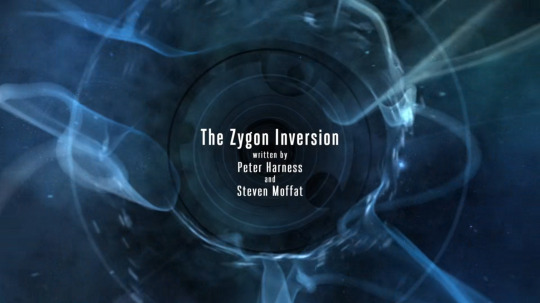
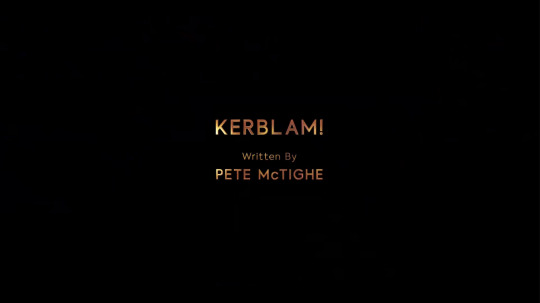
kerblam has charlie. inversion has bonnie. both are explicitly framed as rebels who want to overturn what they perceive as oppression. and both are framed as extremists whose ideologies are quickly dismissed as irrational and dangerous.


neither story meaningfully explores the root cause of rebellion. charlie’s automation-focused ideology is undercut while bonnie’s grievances are left vague or incoherent (treated like cattle how, bonnie? the story doesn't care enough to ask).
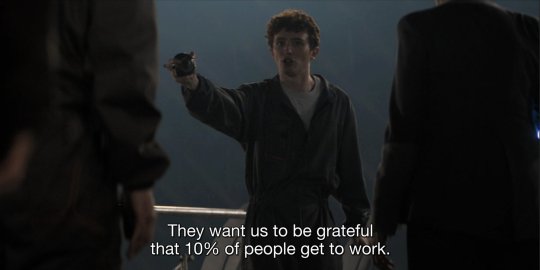
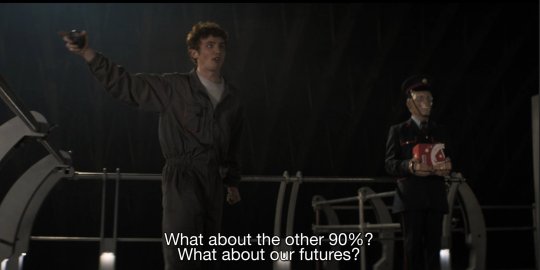
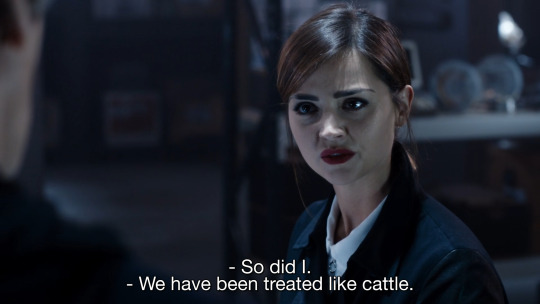
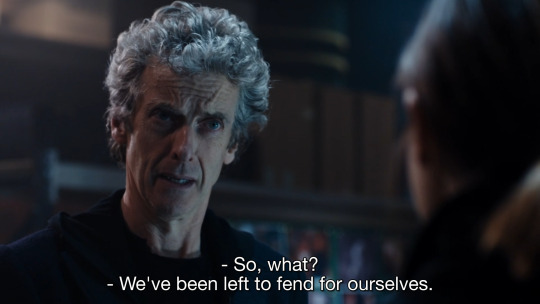
kerblam ends with vague reforms and no structural change. judy may propose the organisation becomes majority-organics, but there’s no guarantee anyone will listen. all of the worker characters die. the two bosses survive.
the background worker characters get one month off but only paid for two weeks. and instead of the horrible minimum-wage jobs being automated, they'll just hire more human workers to inflict further misery upon.

meanwhile; inversion sees the doctor enforce a fragile truce that resets the same failed peace repeatedly. kate’s memory has apparently been wiped multiple times. people keep getting slaughtered. each time, the doctor resets it to more or less how it was at the start.

both feature climaxes with the doctor confronting the antagonist; in both, the terrorist gets an appeal to emotion and neither seriously proposes alternatives to the existing system. radicalism is treated as inherently flawed or harmful, not a potential source of systemic change.




so, where do they differ?
first of all: kerblam addresses real-world issues like amazon-style capitalism, automation, and labor exploitation head-on. inversion uses metaphor.
zygons can never truly be about isis or refugees or imperialist wars or dysphoria, but it can orbit that territory. which lends the story to ambiguity, multiple possible readings, and prioritising a more coherent moral purpose.
inversion follows a clear moral arc with bonnie’s redemption paralleling the doctor’s trauma. she’s equated with him in the time war, framing her feelings as valid. she just needs to find a non-lethal third way, which ends up being stepping into the role of the missing osgood.




charlie gets no such treatment. he is killed off with no emotional payoff, no redemption, and framed as a generational pariah. he’s radicalised by being a millennial.


kerblam is cynical. it lacks any emotional sincerity. it undermines its initial setup with a confused message. but inversion is constructed with nuance, ambiguity, and clear intent by harness and moffat the entire way through with a coherent, optimistic moral.
it also helps that inversion is a major narrative climax in series 9, led by capaldi and coleman, who are the two greatest lead actors in the history of the show. they both deliver all-time nuanced and emotionally devastating portrayals.


so; the main difference comes down to empathy. the zygon inversion has deep empathy for bonnie even if it doesn't have an interest in her specific motives. it has deep empathy for the issues it explores. it has deep empathy for its audience. moffat (+harness) prioritizes empathy.
kerblam has no empathy for charlie and randomly kills him off in a blaze of fire. it has no empathy for the issues it explores and actively inflicts further misery on even more workers. and chibnall (+ mctighe) seems to despise the disaffected youth that is its own audience.
so, where does the interstellar song contest land? well, sort of in between.

there's nothing as explicitly fascist as "the systems aren’t the problem", it does have empathy for the oppressed, and it does end its story with giving the group a voice at eurovision.
naturally; none of this is enough. the story is still about how one individual person of a genocided group went "too far for his good cause" instead of being a story about the oppression.
the doctor still tortures this "evil freedom fighter" but does nothing about the corporation that is behind their oppression (if he's even aware of it).
and the liberal solution to the problem doesn't imply that the material reality of their home planet has actually changed at all, so the killing will likely just continue.
it's a horrible move to write this sort of story in this current political climate. rtd's entire modern doctor who era is deeply cynical in how it tries to faux-appeal to its liberal audience.
but there's just enough wiggle room there that i think you can place it between the zygon inversion and kerblam on this specific axis. moffat's attempt isn't as leftist as it should be, but it's still the best shot so far. let's hope future doctor who stories do better.
#dw#doctor who#ncuti gatwa#15th doctor#series 15#doctor who series 15#rtd#rtd2#russell t davies#juno dawson#kerblam#pete mctighe#the interstellar song contest#doctor who series 11#series 11#jodie whittaker#chris chibnall#peter capaldi#doctor who series 9#jenna coleman#12th doctor#the zygon invasion#the zygon inversion#peter harness#steven moffat
94 notes
·
View notes
Text
hello there, Eurovision fan that wants to watch it but doesn’t want to support the ebu and their shit decisions: I present to you an alternative
This google drive has literally every single Esc for free on it, it is recorded with the British broadcasts commentary, so if you don’t like that I’m sorry but I will say graham norton is very funny
The guy who does it is also very diligent, he got esc 2025 up literally a few hours after it ended, so uh, happy pirating!
45 notes
·
View notes
Note
18, 11
18. Is the physicists' sought-for "theory of everything" a chimera?
You really should ask a physicist about this! As I understand it, the basic fact that makes it debatable is that there is some technical issue which means you can't handle gravity in the same mathematical framework as the other forces. But what lesson should we draw from that? I guess we should be less confident that they got the description of the other forces right. But even before gravity people were unhappy with renormalization theory ("it is what I would call a dippy process"—Feynman), and meanwhile, supposedly there are formalisms like string theory that can accommodate gravity, it's just that it's impossible to make progress without a particle accelerator the size of the solar system. From my layman's point of view, it seems like there's not so much philosophical lessons to be drawn from the fact that renormalization failed. In some alternative history some other mathematical approach could have been popular, but everything would still be underconstrained just from lack of experimental data...
Conversely, I guess there were physicists in the 1980s who thought they would recognize the ToE just by its mathematical elegance and solve fundamental physics in their lifetime, and that hope seems very chimerical now.
11. Is hip-hop/rap more political than the Eurovision Song Contest?
This question feels like a throwback to 2015! Like, the reason hip-hop is considered political is that it's associated with Blackness, and hence with questions of race which (along with sexuality) is the most contested political issue; meanwhile the Eurovision is avowedly "apolitical", and as we all know "to be neutral is to be complicit". But now in the 2020s with wars in Ukraine and around Israel, nationalism seems less harmless, so maybe even the stupid Eurovision pop music can become controversial again.
I think ultimately rap is an artistic form, not an ideology or a movement, so you can't really say that it's politically significant in itself. Otherwise we again end up in 2015 when everyone was briefly convinced that Hamilton had achieved the great unified theory of politics and music...
23 notes
·
View notes
Text
tvoj pogled mе še zavaja in fasada še stoji
A Joker Out Big Bang Fic (tumblr)
I was paired with the wonderful @eurovisijan whose art can be found at the link below and embedded in the work on AO3!
Relationships: Nace Jordan/Jan Peteh, Nace Jordan & Joker Out (Ensemble), Jure Maček & Jan Peteh Characters: Nace Jordan, Jan Peteh, Jure Maček, Kris Guštin, Bojan Cjvetićanin Tags: 5+1 Things, with some interludes, POV Alternating, POV Outsider, Secret Relationship, Oblivious Bojan Cvjeticanin, Oblivious Kris Guštin, Intervention, Misunderstandings, acts of service, Established Relationship, Bets & Wagers, Pre-Eurovision Song Contest
Info: Rated T | No Archive Warnings Apply | 11,776 words | Complete AO3 | Accompanying Art (AO3 | tumblr) by @eurovisijan
Excerpt & Summary:
Nace’s reaction is… concerning, for all that it’s understandable. Because where Jan had been slow to warm to their newest member, Nace had had the opposite problem: he’d fallen for Jan hard, fast, and very much noticeably. At least to the rest of the band, and since Jan is usually pretty perceptive, there’s no way he doesn’t know. Which makes it all the more cruel of him to draw attention to the set of lines running from his shoulder blades to the small of his back, a little uneven and still red. * Five times where Bojan and Kris thought they had to protect Nace from Jan, and once where it becomes clear that isn’t necessary.
30 notes
·
View notes
Text
IMO, the Eurovision boycott was successful. Figures this morning reported that there was a 25% reduction in viewers (and that means less voting, and less money going to the EBU) in the UK alone - if there's similar figures abroad, that's a very large chunk of cash they lost out on.
Add to that the very visible protest efforts not only from the crowds in Malmö, but also the contestants themselves and the crowd in the arena - the EBU felt the need to edit Israel's performance so that the booing wasn't quite as loud, and even added fake cheering. They kept cutting away from the clearly unhappy audience who turned off all their lights (a 'black sea') to indicate their displeasure.
Then there was the backstage incident with the Dutch team, where EBU camera crews harassed them to the point where the Dutch performed, Joost Klein, snapped back at them - resulting in his unfair disqualification before the final and a lot of anger from the Dutch broadcasters. They refused to give their votes live and are even suing the EBU over it.
Ireland's Bambie Thug managed to successfully sneak in some pro-Palestine messages last minute into their costume, and Switzerland's Nemo, who won the contest, made a pointed speech directed at both the audience and EBU. Feelings were even stronger in the semi-finals, with France's Slimane stopping her own performance to give a speech on stage, and further protests from Australia, Ireland and others.
All through the night there were reports of people registering their disapproval: several guests dropped out and refused to give live votes. Loreen, the incumbent winner, stated her refusal to award Israel in person if they were victorious.
The EBU has lost money and severely damaged its reputation, and for what? It doesn't look like they've gained anything from this. Going forward, people will remember their stance and complicity in Israel's propaganda efforts. It's kind of ironic that next year's show will be in the infamously neutral Switzerland.
Maybe they'll learn from this. Hopefully we will, too. In the meanwhile, don't stop talking about Palestine.
As a final addition, I want to highlight that there was a grassroots alternative contest organised last night - FalastinVision. It was plagued with technical issues but it had a lot of heart and featured 15 entrants with songs highlighting the genocide and the global politics surrounding it. I'm not sure what viewing figures it got - I glimpsed at least 730 active viewers on the livestream and know that most of those were watch parties and groups (like my own), so reasonably viewership was in the few thousands.
#free palestine#palestinian genocide#eurovision#eurovision 2024#eurovision boycott#bds movement#bds boycott
128 notes
·
View notes
Text
Eurovision is a pretty big deal, but is it more important than solidarity with the Palestinian people? No. Don’t be stupid.
[...]
Potential performers have claimed they will not attend if Israel is allowed to participate or will lobby the EBU to kick them out. Former participants and thousands of musicians from Finland, Iceland and Sweden have called for Israel to be excluded. Boycott Divestment and Sanctions (BDS) called for the expulsion of Israel. When that failed, March 2nd they called for a boycott of the song competition. Eurovision journalists have either intentionally limited their coverage of Israel in Eurovision 2024 or have dealt with the EBU’s hypocrisy head on (and received death threats). Letter writing campaigns have been directed at national broadcasters, the EBU, the performers and sponsors (you can find the details here if you are interested). Alternative, boycott-friendly watch parties are being organised (including this one in Berlin organised by myself which will be fundraising for Medical Aid Palestine). It is impossible to keep politics out of this contest. Banning Russia was a political move and the shows of sympathy and support to Ukraine by performers and even the contest organisers themselves was a political act—an act that, as far as I can tell, has been appreciated by viewers and fans. However, if Russia can get banned for an invasion, Belarus can get banned for media repression, but Israel can remain, the EBU is sending a pretty clear signal that Palestinian lives don’t matter.
94 notes
·
View notes
Text
[ENG translation] Jamming sessions, the 'Jure Maček Curve', and new music - A Joker Out interview
An interview with Bojan Cvjetićanin and Kris Guštin, published on the Gedankengroove website on 12.04.2024. Original article written by Elie Mück, photos by Elie Mück. English translation by olenalinasarah and @nyx-aira, proofread by IG GBoleyn123.
Note: As the interview was originally conducted in English, author Elie Mück collaborated with us to give us the original wording wherever it was necessary for the right meaning to come across. Thank you, Elie!
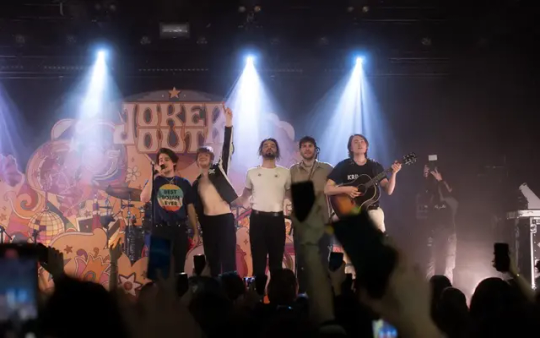
"What would I do in this black night without you?" That's what Joker Out ask themselves in their (as-yet) unreleased song Šta bih ja. I was able to visit the five men from Slovenia in Cologne at the end of March and talk with Bojan and Kris about the song and the 'See You Soon' tour, which was almost over at that time.
The indie rock band was able to reach a wide audience across Europe with their participation in the Eurovision Song Contest 2023. Their song Carpe Diem is their most successful release to date with over 20 million streams on Spotify. After several concerts across Europe and an arena show in their home country, Bojan, Kris, Nace, Jan, and Jure travelled to London at the beginning of the year. The two-month stay in London, which didn't only consist of playing Jenga and cooking (as their Instagram stories made it seem), served as preparation for a studio session in April. Before that, the group went on a European tour at the beginning of March, playing 22 concerts in 14 countries - including five shows in Germany. Kris and Bojan tell me what's behind the changing setlists and how the band comes together in jamming sessions.
Elie: To start with, how are you doing? Did you get to Cologne safely?
Bojan: We're doing well. We arrived this morning and slept until 1pm, so we're well rested. Cologne has treated us very well. The venue is perfect, very cosy, and the staff are great.
Elie: The tour is almost over, what are your impressions so far?
Bojan: To be honest, the tour has been fantastic so far! The time has gone by super fast. We've seen so many more cities than last time. When you start touring, you usually just visit the capital cities and imagine that those are the only places you can play. But this tour consists of mostly the second or third biggest cities in each country and the shows have been great so far. We are thrilled with how many people have come and how their reactions have been. So, we're having a lot of fun.


Elie: It's interesting to see that you're playing very different sized shows on this tour. The hall in Helsinki, for example, has a capacity of about 1,500 people, whereas in Munich only about 400 people fit in. What do you prefer? The bigger gigs or the smaller ones?
Kris: It depends a lot on the audience and our mood. We have to go on stage in a good mood. I don't think the number of people makes a difference. At least not at these sizes. An arena show with 10,000 people is comparatively very impersonal and you focus more on the show and what you're doing. I definitely prefer the smaller gigs, but a concert in front of 500 or 1,500 people feels about the same.
Elie: I've heard from other artists that they prefer the bigger concerts because they have more space on stage, is that similar for you?
Bojan: For me personally, the concerts with an audience of 1,500 people are the ones where I feel most comfortable. The stage is big enough for me to move around freely without a fear of tripping over something and it still feels like I can interact with every person in the room.


Elie: Compared to the tour in autumn, you are now playing a varying set. I looked at your setlists from the last few shows and it seems like you have two or three setlists that you alternate between. Who came up with that and why did you want to vary the set?
Bojan: I think we collectively came up with that. When you play 22 shows in a month, you can get stuck in routine. It can feel like things are just repeating themselves and the mood of the shows is, in a way, predetermined by the songs you play. That's why we decided to break it up and make it a bit more fun. It's very cool because we have three setlists and I have no idea which song is coming next. That's good for me because it's always a bit of a surprise. It makes the whole thing more exciting. The fans like it too. There have been some who came to several concerts and heard different songs each time.
Elie: How did you find out which songs work together?
Bojan: It was a long process.
Kris: We sit down together and try to find out what works best. It can take several days but sometimes it works straight away. Our drummer Jure has his own technique.
Bojan: We call it "The Curve".
Kris: The "Jure Maček Curve" which determines how our concerts should go in terms of mood. We decide, for example, that we should start with something energetic-
Bojan: Shh, we should keep that a secret (laughs).
Kris: So, if you have calculated everything with the "Jure Maček Curve", you have a very good set.
Elie: You also play three unreleased songs. Were these the songs that were most ready to be played live or did you have other songs in mind that you wanted to put on the setlist?
Bojan: We had a few more songs that we wanted to try out on the tour. Our idea was that we would have time during the soundchecks and in between to turn the songs into something playable. However, we have less time than we thought, which is why we decided to leave it at these three songs. I really like that because it turned out that one of the songs will definitely be the next single. The fans went totally crazy. Shortly after we had left the stage at the first concert in Helsinki, the lyrics to Šta bih ja were already online. Afterwards we were told that a TikTok of the performance had over 400,000 views, which is crazy. People are even singing along already. It was nice to see that. We've also found things we want to change about the songs. A few things that work and a few that don't work.
Elie: Have these things changed over the course of the tour?
Bojan: Not yet, we have decided to leave them as they are. But we definitely know what we want to change.
Elie: I heard that after the tour you will go to Hamburg to record your next album. What is your plan for the time in the studio?
Kris: What I think will happen in Hamburg is that we will take the first couple of days to record Šta bih ja. I think that song is the most unchangeable in its structure. We have to be quick if we want to release it as a single before the album in autumn. After that we have the rest of the time to work on the things that were created during our time in London, most of which aren't nearly as studio ready. We also recorded our biggest hit Carpe Diem in the studio in Hamburg. That one wasn't nearly as finished either when we got there, so I don't think we have anything to worry about.
Elie: In London you worked on new music in the form of jamming sessions. Did you ever get to a point where you had something like a "creative burnout"? If so, how did you manage to get back into a creative mindset?
Bojan: Definitely. I wouldn't say burnout, more like frustration. Jamming always needs all five of us and of course five different minds can't always work towards the same story. Sometimes things don’t go the way all of us would like it to go for a longer period of time. When that happens, our biggest help is our producer. He always finds the cause of the problem and works with us to find a solution. I think it's important to have someone as a kind of filter. We are all emotionally connected to our music and of course he is too, but in a different way. Our producer is like the sixth pair of eyes and therefore a very important part of the writing process.
Elie: In your latest single Everybody's Waiting you used a keyboard, which is new for you. Do you have any other things you'd like to try out for the new songs?
Kris: Jan bought a mandolin in Berlin. I'm sure that will come up in the studio.
Bojan: I'm sure we want to use more synthesiser. One song we're playing live at the moment originally had a riff that was played with the synthesiser but is now played with the guitar. This change takes away the whole point of the riff. There are many things we want to try out. I think we will also work with choirs or similar vocals. We want to be as free as possible with our creativity for this album.
Elie: We are definitely looking forward to what will happen. I really like the new songs. To finish, a question that I ask often: Which song or album do you think everyone should have listened to at least once in their life?
Kris: I listen to a lot of old music, so I can't recommend anything new. But I would say (They Long To Be) Close To You by Carpenters.
Bojan: Right now, I would definitely recommend a song that I'm listening to a lot at the moment. My song is older too, I'll go with Il mio canto libero by Lucio Battisti. The whole album is very good, we listened to it a lot while Everybody's Waiting was being made.
—
After our chat, it's not long before the band starts their show. They enchant the whole audience with their incredible energy. Like Bojan said, the fans in the first rows are very confident with the lyrics. As soon as Šta bih ja starts, everyone sings along. "What would I do in this black night without you?" The song begins and ends with this line. A song about longing and missing.
The setlist takes us through every emotion and ends with a call to the current generation:
"We've gathered the courage to rebel and make a change," says Novi Val, the last song of the evening. Bojan invites everyone to become part of the "new wave". He says he wishes Joker Out concerts to be and remain a safe space for everyone.
Everyone, including the band, stands arm in arm and slowly sways to the music. A feeling of community accompanies us as we leave the hall of the Kantine and make our way home. Joker Out show that you don't have to stick to one style of music as a group and how diverse the result can be if you don't allow yourself to be restricted creatively. All five of them seem to have an incredible amount of fun with their work and I can only hope that it stays that way for a very long time.
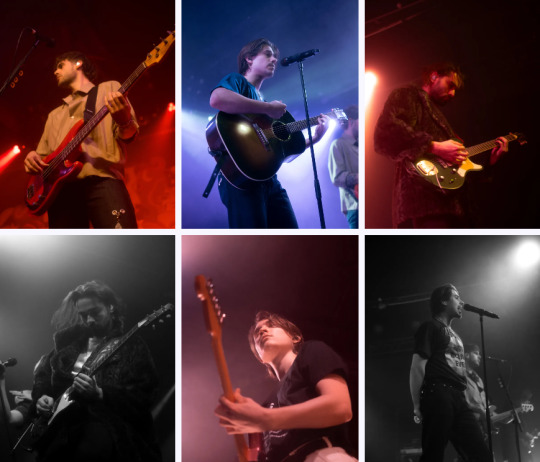
Check out more photos by photographer and interviewer Elie Mück on Gedankengroove!
Do not repost! If you post quotes from this translation, please link back to this post!
62 notes
·
View notes
Text
Eurovision Fact #948:

In 1979, left-wing groups including the workers' representative association CAFIT (Collectif d'Animation pour la Formation et l'Information des Travailleurs) and the activist group Pour le Socialisme hosted an alternative to the Eurovision Song Contest.
Held in Brussels at the Cirque Royal concert hall on March 31st and April 1st, the Counter Eurovision was supposed to provide people with an alternative to the Eurovision Song Contest, which many leftists at the time considered cheesy and host to only conservative pop music. Additionally, the event was considered to be a protest against Eurovision being hosted in Jerusalem that same year.
The Counter Eurovision was meant to host progressive music and give the stage to marginalized groups with small amounts of political influence.
The event had a very different format to the Eurovision Song Contest, as those taking part played a set as opposed to a single song. The most famous of these sets was the 40 minute set by the reggae band Misty in Roots, also known simply as Misty. The set was later turned into the celebrated album Live at the Counter Eurovision 79.
Aside from the album, little information survives about the event.
[Source]
"Eurovision dissenters and the making of a classic reggae album," RTE.ie.
#esc facts oc#eurovision#eurovision song contest#esc#eurovision facts oc#esc 1979#counter Eurovision#counter Eurovision 79#counter Eurovision 1979#mist#Misty#Misty in Roots
10 notes
·
View notes
Text
Outside the Serbian capital, LGBTQ+ activists are campaigning for more tolerance and better healthcare access and against discrimination – shadowed by the constant threat of violence.
“Novi Sad has a reputation in the country as an alternative and open-minded city, but all of us who grew up in Novi Sad have a different experience,” says Aleksa Savic, executive director of the LGBTQ+ activist group Izadji (Come Out), which operates in Serbia’s second-largest city, Novi Sad.
LGBTQ+ people growing up in Serbia often suffer bullying in schools, discrimination in the world of sport, and insults and violent attacks in public spaces. As far as homophobic prejudice is concerned, Novi Sad isn’t much different from the capital Belgrade or other cities, according to Savic.
Last week’s Novi Sad Pride Week, which Savic and Izadji were involved in organising, came less than two weeks after a lit flare was thrown from a neighbouring yard at participants in a drag performance in the city on May 2. Because of the attack, the Pride Week were held under increased police security.
This was the first attack on the Novi Sad event since it was first held in 2019. Belgrade Pride has been attacked several times over the years; the annual event still goes ahead, but is held under strict police guard.
Savic thinks that the incident in Novi Sad is “indicative” of the environment in Serbia, where the authorities have been accused of fostering a culture of violence and tolerating thuggish behaviour and attacks on activists.
“We believe it’s connected to the current socio-political context,” he said. “There’s a constant justification of violence and a lack of punishment in this country. That sends a message to perpetrators that they won’t face consequences and it encourages them.”
‘We are citizens too’
The defiant slogan of this year’s Novi Sad Pride Week was “Ostajem” (“I’m Staying”). As well as discussions about politics, health and LGBTQ+ art and culture, there were drag shows, a ‘queer bazaar’ and a communal screening of the Eurovision Song Contest final.
The organisers also wanted to show support for mass protests that erupted in November 2024 in Serbia, led by students and sparked by an infrastructure collapse at Novi Sad railway station left 16 people dead, which many blamed on corruption and official negligence.
“We are citizens of Novi Sad too, and the fatalities affected us too, and it’s important to us that those responsible for the murder are held accountable,” said Savic.
“We want to live in a state governed by the rule of law, because just as the institutions failed here [over the station disaster], they have also failed in the lives of LGBTI people, since we still don’t have a law on same-sex partnerships or gender identity,” he added. He argued that state institutions often fail to respond in a timely and appropriate manner to discrimination and violence.
The Pride Week organisers are calling for improvements to healthcare services for transgender people, and a swift and appropriate state response to hate speech and hate-motivated crimes against LGBTQ+ people.
Other demands include appointing liaison officers for the LGBTQ+ community in police stations in the wider Novi Sad area, introducing education in Novi Sad’s schools on sexual orientation and gender identity, and providing free pre-exposure and post-exposure prophylaxis (PrEP and PEP) medicines for HIV prevention.
The Izadji group has also launched a petition calling for the appointment of a team for transgender issues – psychiatrists, endocrinologists and surgeons – at the Clinical Centre of Vojvodina, the major health clinic in the region. At the moment in Serbia, such a team exists only in Belgrade.
“That team is responsible for the whole of Serbia, which, given the capacity, isn’t enough to cover everyone who needs this process,” Savic argued, adding that it’s also complicated and expensive for people to travel to Belgrade for all their appointments.
“We’re talking about people who are often heavily discriminated against in the job market. They don’t have a job and can’t get one,” he pointed out.
Savic said that the Serbian state leadership’s friendly cooperation with states where LGBTQ+ people are oppressed is concerning. “Of course, we’re worried that something like that could happen here as well, because there’s a constant balancing act,” he said.
“On one hand, the state pretends to be working on European values, while on the other, we see cooperation with countries and global powers that are much more right-wing-oriented, where human rights are at the very bottom of the agenda.”
9 notes
·
View notes